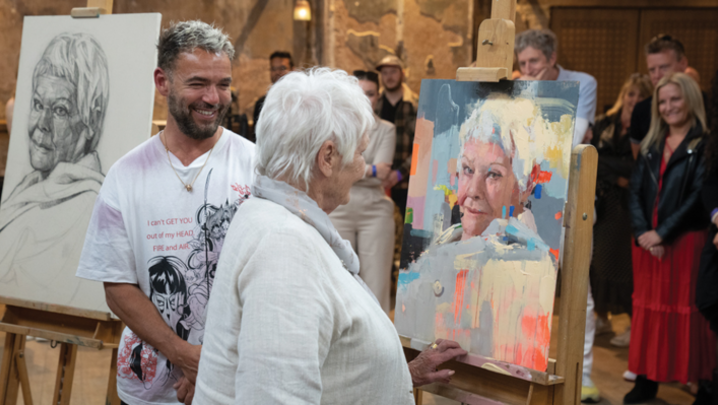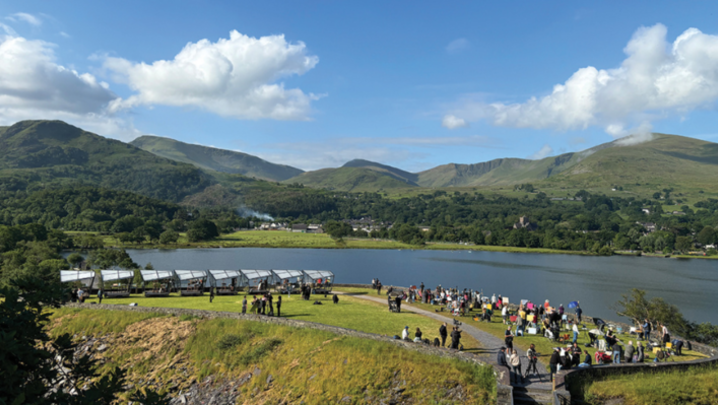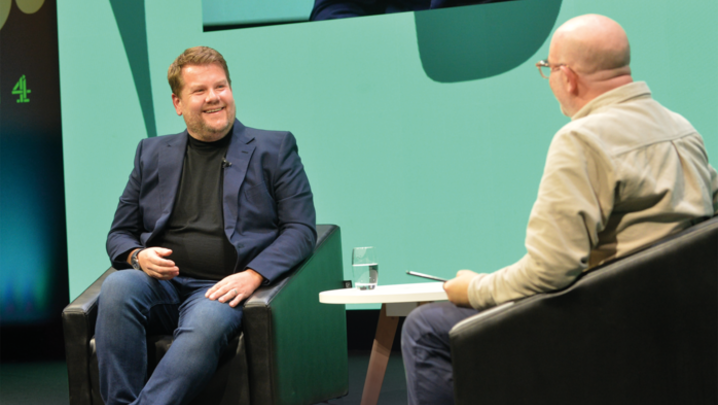Sky Arts is about to debut as a free service. Phil Edgar-Jones, the man in charge, explains to Steve Clarke what new viewers can expect
For many of us, starved of enjoying a real performance in a theatre or a concert hall these past months, watching Sky Arts in lockdown was a revelation. Most of us knew about its flagship shows Urban Myths and Portrait Artist of the Year. We were less familiar with the service’s sheer eclecticism, which encompasses everything from ballet to the blues and Bono.
“On some occasions, our audience figures increased by as much as 40%,” says Phil Edgar-Jones, who runs the channel. “During lockdown, we found that, across the board, there was a real hunger for cultural content. It wasn’t only Sky Arts that benefited from this.”
A spin-off show, Portrait Artist of the Week, perhaps reflecting a desire by some people in lockdown to take up painting, was one notable success.
The programme, which will return in October, was first shown on Facebook Live before transferring to the channel. “What we took away from this was that there is a great sense of community that can be built around people’s passion points,” he observes.
Edgar-Jones will soon be responsible for another milestone in Sky Arts’ history when, on 17 September, Sky Arts stops being a subscription-only service and goes free-to-air.
The move is bound to increase the network’s popularity. In some quarters, it is being interpreted as a direct challenge to the BBC. Several commentators have remarked on what they perceive as a diminishing number of regular arts slots available on BBC television. Even BBC Four has latterly pivoted away from the arts to the extent that presenters such as the brilliant Andrew Graham-Dixon are rarely seen on the channel.
Edgar-Jones, who joined Sky as head of entertainment in 2012, plays down any suggestion that having Sky Arts on Freeview is likely to lure viewers away from BBC TV’s arts coverage.
“The BBC’s arts content is fantastic. It’s very different to ours. We think about how we can create work that has a Sky flavour to it. Participation is at the heart of that,” he insists. “I don’t see it as a zero-sum game. We’re all in it together. I’d like to work with [the BBC], not against it. I’d love to partner with the BBC on projects....
“We always ask ourselves: ‘Can we be distinctive and do something different to the BBC and Channel 4?’ I can say to an artist, ‘You can have the channel for as long as you like, we’ll take out the ad breaks, it’s yours, do what you like with it’.”
Why, then, is Sky Arts removing its pay wall? The channel’s impressive on-demand programming, amounting to around 2,000 hours of cultural content, will remain exclusive to Sky subscribers. “We’ve been looking at it for a while, the best part of 2019. We did a lot of research around the channel and talked to people in the arts world, practitioners and leaders, to see what it was about the channel that was important to them.”
Three conclusions were drawn from this process – the desire to make Sky Arts more widely accessible, the need to help drive diversity and inclusivity, and the aim of increasing participation in the arts.
“So it made logical sense to allow the channel to reach more people,” explains Edgar-Jones, who says he is now going out again to sample the arts. Recent forays have included a local art-house cinema in north London and the opera, socially distanced of course, at Glyndebourne. He also plays guitar and recently mastered David Bowie’s 1970s classic Starman.
“Sky is a public service broadcaster,” he continues. “Giving Sky Arts away free is part of our service to the public.… I always say to people, ‘You won’t like everything on the channel, but I guarantee you’ll find something that you like.’”
When James Murdoch was running BSkyB in 2005 he purchased the remaining shares in Artsworld that BSkyB didn’t already own and turned the channel into Sky Arts. “James deserves a lot of kudos for doing that,” says Edgar-Jones. “He’s a passionate supporter of the arts and making them more accessible. James pioneered £10 opera tickets for people who wouldn’t normally go to see a live opera.”
Could having a bigger audience eventually lead to more advertising revenue when the market begins to turn? “You might not believe this, but we haven’t had a commercial discussion,” replies Edgar-Jones. “We think we’ll reach a bigger audience, which is attractive to all the partners we work with.
“I’m passionate about this channel. Having run it for five or six years, I’ve always wanted to get it to more people. The business has always supported Sky Arts as something that doesn’t have to be massively commercial or populist. I don’t get judged on ratings.
“It enhances the Sky brand. From a Sky perspective, that’s a very positive thing. There is no commercial pressure around the channel.
“In fact, quite the opposite. I’m encouraged to do things that are bold, noisy, creative, and to encourage new work, help support the arts and help support arts practitioners,” says Edgar-Jones, who, in common with many viewers, enjoyed Grayson’s Art Club, with Grayson Perry, on Channel 4 during the early weeks of lockdown.
How, then, will Sky Arts change when it is free? Might it become less eclectic and more populist, perhaps more pop and less Prokofiev?
“We’re not afraid of being popular and accessible,” he says. “There’s a wide range of stuff on the channel. At one end of the scale, we can do Portrait Artist of the Year, which we expect to become more popular still, while also doing 15 hours of The Ring cycle in German in one sitting.”
Thankfully, not everything on Sky Arts requires that kind of dedication or stamina. Upcoming shows this autumn include: series four of Urban Myths, including Steve Pemberton starring in Les Dawson’s Parisienne Adventure; live coverage of ENO’s first drive-in opera, a new production of La bohème; No Masks, a new drama from Theatre Royal Stratford East based on the pandemic stories of key workers in east London; Life & Rhymes, a celebration of the spoken word hosted by Benjamin Zephaniah; and Danny Dyer on Harold Pinter.
“A lot of our work is trying to think of ways to work beyond television. We’re uniquely positioned to be more than just a TV channel. We can commission in the real world and meet people in a way that other channels can’t,” says Edgar-Jones. “We’re moving beyond being a spectator in the arts to being an active participant. We want to get communities involved in creating art with us.”
An example of this approach is a new show, Landmark, in which artists and local communities across the UK attempt to create a new British landmark. “We want artists to be at the forefront of our programmes and not presenters,” he says.
Sky doesn’t reveal its programme budgets. Edgar-Jones says it is less about their size than where the money goes. “In the arts, every practitioner is able to stretch things further than people who buy drama can,” he notes wryly.
Edgar-Jones needs no reminding of the existential crisis that arts organisations are undergoing and is anxious that “a layer of new talent”, potentially a forgotten generation, risks being extinguished by the pandemic’s economic impact.
Sky Arts is looking at what it can do: a bursary scheme is being set up to support new and diverse voices in the arts industry.
He concedes that, overall, British broadcasters need to try harder on diversity: “We have to do a lot more. It’s been a perennial problem. There has been scheme after scheme after scheme. Sky has put money into some of these.
“We’ve made great strides.… When I started in television, diversity was about whether you were from Oxford or Cambridge [Edgar-Jones went to neither]. Television has come a long way from that. We include voices from all communities.”







